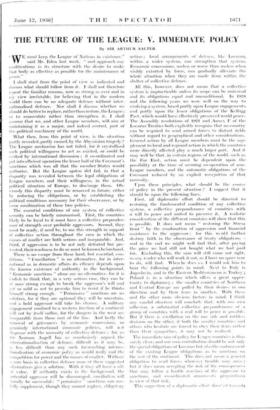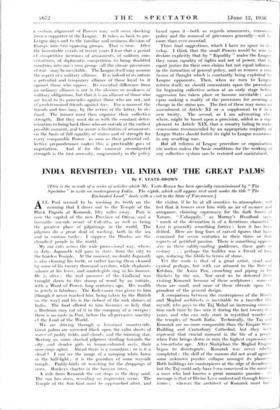THE FUTURE OF THE LEAGUE: V. IMMEDIATE POLICY
By SIR ARTHUR SALTER
,WE must keep the League of Nations in existence." said Mr. Eden last week. " and approach any modifications in its structure with the desire to make that body as effective as possible for the maintenance of peace."
I shall start from the point of view so indicated and discuss what should follow from it. I shall not therefore repeat the familiar reasons, now as strong as ever and in my view irrefutable, for believing that in the modern world there can be no adequate defence without inter- nationalised defence. Nor shall I discuss whether we should do better to replace, rather than restore, t he League : or to emasculate rather than strengthen it. I shall assume that we, and other League members, will aim at maintaining it as a major, and indeed central, part of the political machinery of the world.
What then, from this point of view, is the situation partly revealed, partly caused, by the Abyssinian tragedy? The League mechanism has not failed, for it crystallised such political willingness to act as existed, or could be evoked by international discussion ; it co-ordinated and put into efficient operation the lesser half of the Covenant's sanctions which was all that the member States would authorise. But the League system. did fail, in that a disparity was revealed between the legal obligations of League members and their willingness, in the actual political situation of Europe, to discharge them. Ob- viously this disparity must be removed in future, either liv reducing the obligations, or by establishing the political conditions necessary for their observance, or by some combination of these two policies.
The essential conditions of any system of collective security can be briefly summarised. First, the countries likely to be loyal to it must have a collective preponder- ance of strength over probable aggressors. Second, they must be ready, if need be, to use this strength in support of collective action throughout the area in which the causes of conflict are both serious and inseparable. And, third, if aggression is to be not only defeated but pre- vented, their readiness to do so must be known beforehand.
There is no escape from these hard, but essential, con- ditions. " Conciliation " is no alternative, for in inter- national as in domestic affairs its efficacy depends upon the known existence of authority in the background.
Economic sanctions " alone are no alternative, for it is foolish to think that, in a very serious case, they can he at once strong enough to break the aggressor's will and yet so mild as not to provoke him to resist if he thinks himself strong enough. " Permissive " sanctions are no solution, for if they are optional they will be uncertain.
a bold aggressor will take his chance. A military engagement confined to a western fraction of a continent Avill not by itself suffice, for the dangers in the west are inseparable from those east of the line. And lastly the removal of grievances by economic concessions, or _!.,aluinely international economic policies, will wit i,pense with the necessity of collective defence ; for, as Sir Norman Angell has so conclusively argued, the internationalisation of defence, difficult as it may be. is less difficult than any such far-reaching interna- tionalisation of economic policy as would really end the competition for power and the causes of conflict. Without a sure basis in collective defence none of these suggested alternatives give a solution. With it they all have a role of value. If authority exists in the background. the potential aggressor will be discouraged. oonciliation will usually be successful ; " permissive " sanctions can use- fully supplement, though they cannot replace, obligatory action ; local arrangements of defence, like Locarno, within a wider system, can strengthen that system.
Economic concessions, useless or worse than useless when visibly extorted by force, can gradually alleviate the whole situation when they are made from within the shelter of collective defence.
All this, however, does not mean that a collective system is impracticable unless its scope call be universal and its obligations equal and unconditional. In 1928 and the following years we were well on the way to evolving a system, based partly upon League engagements and partly upon the lesser obligations of the Kellogg Pact, which would have effectively preserved world peace. The Assembly resolutions of 1921 and Annex I: of the Locarno Treaties both explicitly recognise that no country can be required to send armed forces to distant fields without regard to geographical and other considerations.
General action by all League members must be the sup- plement to local and regional action in which the countries more directly affected play a much larger part. And it may well be that, in certain regions of the world, such as the Far East, action must be dependent upon the possibility at the time Of securing co-operation of non- League members, and the automatic obligations of the Covenant reduced by an explicit reco;nition of that necessity.
Upon these principles, what should be the course of policy in the present. situation ? 1 suggest that it should be upon the following lines.
First, all diplomatic effort should be directed to restoring the fundamental condition of any collective system, a collective preponderance of countries with a will to peace and united to preserve it. A realistic consideration of the different countries will show that this is possible. It does not Mean " restoring the Stresa front " by the condonation of aggression and financial assistance to the aggressor ; for this we uld further destroy faith in the observance of treaty obligations - and in the end we might well find that, after paying the price we had still not bought. what we had paid for. Excluding this, the sum will still conic out right, as any reader who will work it out, as I have no space now to do. will find. When he does so, I would ask him to bear the following points in mind. Next to Italy is Jugoslavia, and in the Eastern Mediterranean is Turkey ; Poland is in a situation which offers a great oppor- tunity to diplomacy ; the smaller countries of Northern. and Central Europe are pulled by their desires in one direction and by their fears in another. With these and the other more obvious factors in mind, I think any candid observer will conclude that, with our own adhesion, a substantial collective preponderance of :t group of countries with a real will to peace is pos.Ohle. But if there is vacillation on the one side and ruthless decision on the other, if both the smaller countries and others who hesitate are forced to obey their fears rather than their sympathies, it may not be realised. The immediate aim of policy for I.:gigue countries is thus surely clear; and our own contribution should be not only the special obligations of Locarno but also t he endorsement of the existing League obligations as to sanctions uu the rest of the continent. This does not. mean a general obligation to send forces wherever trouble may arise ; but it does mean accepting the risk of the consequences that may follow a hostile reaclioa of the aggressor to sanctions. and co-ordinated arnurnreuts preparations in view of that risk. a certain alignment of Powers may well seem shocking from a supporter of the League. It takes us hack to pre- League days and to the familiar and ominous division of Europe into two opposing groups. That is true. After the lamentable events of recent years I fear that a period of competitive increases of armaments, of military con- versations, of diplomatic competition to bring doubtful countries into one's own group—all the classic precursors of war—may he inevitable. The League itself may assume the aspect of a military alliance. It is indeed of its nature a potential and temporary alliance of those loyal to it against those who oppose. Its essential difference from an ordinary alliance is not in the absence or weakness of military obligations, but that it is an alliance of those who are loyal to its principles against those who are not, not Of predetermined friends against foes. For a moment the friends and foes may, by the action of the latter, he de- fined. The former must then organise their collective Strength. _Btit they must do so with the constant deter- mination to bring back those who are outside at the earliest possible moment, and to secure a limitation of armaments on the basis of full equality of status and of strength for every comparable Power—as soon as their potential col- lective preponderance makes this a practicable _got...i of negotiation. And if for the moment co-ordinated strength is the first necessity, magnanimity in the policy based upon it—both as regards armaments, economic policy and. the removal of grievances generally—will be more than ever essential.
Three final suggestions, which I have no space to de- velop. I think that the small Powers would be wise to declare explicitly that by " Equality " under the League they mean equality of rights and not of power, that is, equal justice for their own claims but not equal influence in the formation of general policy, and so remove a con- fusion of thought which is constantly being exploited by League opponents. Then, when we turn to League reform itself, we should concentrate upon the procedure for beginning collective action at an early stage before aggression has taken place or become inevitable ; and upon making a reality of the provisions for securing a change in the status quo. The first of these may mean an amendment of Article XI or a supplement to it in a new treaty. The second, as I am advocating else- where, might be based upon a provision, added as a sup- plement to Article XIX, that a country failing to make concessions recommended by an appropriate majority of League States should forfeit its right to League assistance in any resulting war. .
But all reforms of League procedure or organisation are useless unless the basic conditions for the working of any collective system can be restored and maintained.























































 Previous page
Previous page